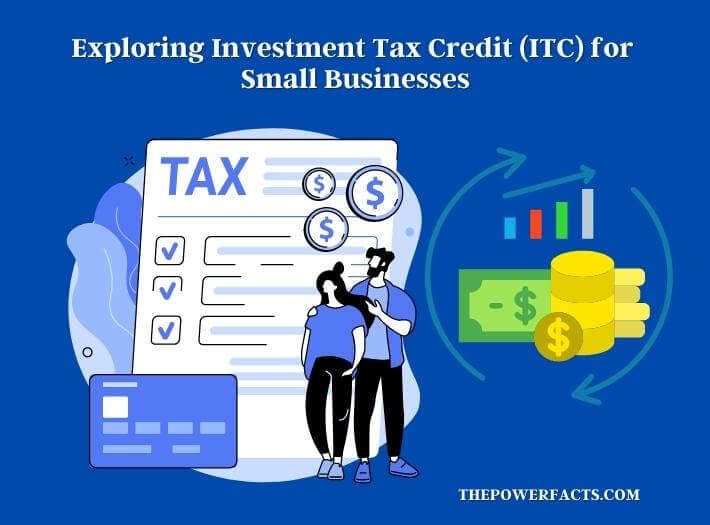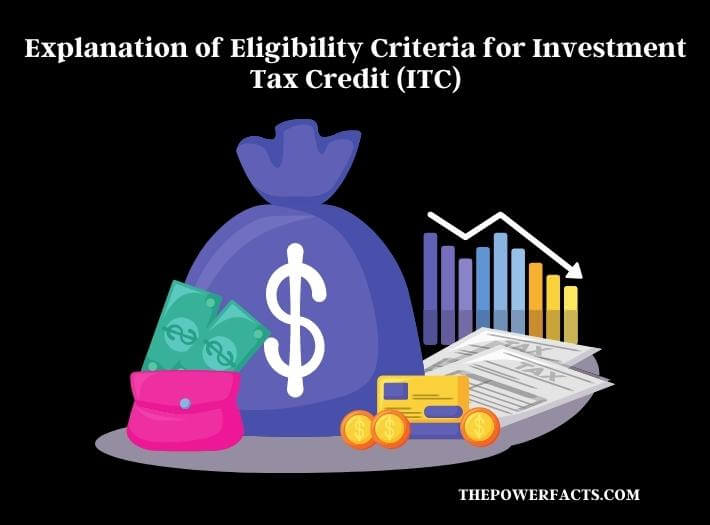Starting and running a small business can be a challenging endeavor, and for many business owners, every dollar counts. One way for small businesses to increase their cash flow and reduce their tax liability is by taking advantage of the Investment Tax Credit (ITC). The ITC is a federal tax credit that businesses can claim for investing in renewable energy systems, energy-efficient equipment, and other qualified assets.

For small businesses, the ITC can provide significant financial benefits, including reduced tax liability, increased cash flow, and long-term cost savings. Many business owners may not be aware of the eligibility criteria and how to claim the credit.
Explanation of Eligibility Criteria for Investment Tax Credit (ITC)
To be eligible for the Investment Tax Credit (ITC), a business must meet certain criteria. Here are some of the key eligibility requirements:
| Ownership | The business must own a renewable energy system or energy-efficient equipment that qualifies for the ITC. If the equipment is leased, the lessor may be eligible for the credit. |
| Type of Equipment | The equipment or system must fall under one of the categories eligible for the ITC. This includes solar energy systems, wind energy systems, fuel cells, geothermal systems, and more. |
| Installation Date | The equipment must be installed and placed in service during the tax year for which the credit is being claimed. For example, if a business wants to claim the ITC for the tax year 2022, the equipment must be installed and in service by December 31, 2022. |
| Certification | The equipment or system must qualify for the ITC by the appropriate certification body. The certification process can vary depending on the type of equipment or system. |
| Tax Liability | To claim the full amount of the ITC, the business must have a tax liability that is equal to or greater than the amount of the credit. If the credit exceeds the tax liability, the excess may be carried forward to future tax years. |

Understanding the Benefits of Investment Tax Credit (ITC)
The Investment Tax Credit (ITC) provides several benefits for small businesses that invest in renewable energy systems and energy-efficient equipment. Here are some of the key advantages of the ITC:
Reduced Tax Liability: The ITC allows businesses to claim a credit against their tax liability, reducing the amount of taxes they owe. The credit amount can be up to 26% of the cost of the eligible equipment or system.
Increased Cash Flow: By reducing their tax liability, businesses can free up cash flow that can be reinvested in the company or used to cover other expenses.
Lower Energy Costs: Investing in renewable energy systems and energy-efficient equipment can result in significant cost savings over the long term. For example, a solar energy system can help a business generate its own electricity, reducing reliance on the grid and lowering energy costs.
Environmental Benefits: Renewable energy systems and energy-efficient equipment are environmentally friendly and can help businesses reduce their carbon footprint. This can be an attractive selling point for customers who are environmentally conscious.
Improved Reputation: By investing in renewable energy systems and energy-efficient equipment, businesses can improve their reputation and demonstrate their commitment to sustainability.
How to Claim Investment Tax Credit (ITC)?
To claim the Investment Tax Credit (ITC), small businesses must follow these steps:

Determine Eligibility
First, make sure that your business meets all the eligibility criteria for the ITC. This includes owning the renewable energy system or energy-efficient equipment, meeting the installation date requirement, and having a tax liability equal to or greater than the amount of the credit.
Calculate the Credit
Determine the amount of the credit by calculating 26% of the eligible equipment or system cost.
Complete IRS Form 3468
The ITC is claimed by completing and filing IRS Form 3468, which is titled “Investment Credit”. The form requires information about the type of equipment or system, the date it was placed in service, and the cost of the eligible equipment or system.
Include Form 3468 with Tax Return
Once the form is completed, it must be included with the business’s tax return for the year in which the credit is being claimed.
Carryforward Unused Credit
If the business’s tax liability is less than the amount of the credit, the excess credit can be carried forward to future tax years.
Seek Professional Assistance
The rules and regulations around the ITC can be complex, and it’s essential to ensure that the credit is claimed correctly. Small businesses are advised to consult with a tax professional or accountant to ensure that they meet all the eligibility criteria and are claiming the credit accurately.
If you maintain these steps, small businesses can claim the Investment Tax Credit and take advantage of the financial benefits that it provides.
Limitations of Investment Tax Credit (ITC)
While the Investment Tax Credit (ITC) offers several benefits to small businesses, there are also some limitations to be aware of:
Limited Timeframe
The ITC is set to decrease in value over time, and the current rate of 26% is only available for systems placed in service before the end of 2022. After that, the rate will gradually decrease until it reaches 10% for commercial systems and zero for residential systems.
Eligible Technologies
The ITC only applies to specific technologies, such as solar energy, wind energy, geothermal energy, and fuel cells. Businesses that invest in other types of renewable energy systems or energy-efficient equipment may not be eligible for the credit.
Tax Liability Requirement
To claim the ITC, businesses must have a tax liability equal to or greater than the amount of the credit. Businesses with limited tax liability may not be able to claim the full amount of the credit in a single tax year.
Installation Date Requirement
The ITC is only available for renewable energy systems or energy-efficient equipment that are placed in service during the tax year in which the credit is claimed. Businesses that delay installation may miss out on the credit.
Complexity
The rules and regulations around the ITC can be complex, and businesses may need to seek professional assistance to ensure that they meet all the eligibility criteria and claim the credit correctly.
Recapture Provision
If a business disposes of the renewable energy system or energy-efficient equipment within five years of installation, it may be required to pay back a portion of the credit received.
While the Investment Tax Credit offers significant benefits for small businesses, there are limitations to be aware of. Understanding these limitations can help businesses make informed decisions about whether to invest in eligible technologies and claim the credit.
Can Texas Businesses Benefit from Tax Credits for Installing Solar Panels?
Texas businesses can significantly benefit from tax credits by installing solar panels, thanks to the Texas solar panel tax regulations. These regulations offer lucrative incentives for businesses to invest in renewable energy, promoting sustainability and cost-savings. By taking advantage of these tax credits, Texas businesses can lower their energy expenses and reduce their environmental impact.
How Small Businesses Can Take Advantage of Investment Tax Credit (ITC)?
Small businesses can take advantage of the ITC in several ways, including:

- Small businesses can invest in solar panels, wind turbines, geothermal systems, and other renewable energy systems to qualify for the ITC. These investments can reduce energy costs and provide long-term cost savings for the business.
- Small businesses can also upgrade to energy-efficient equipment, such as HVAC systems, lighting, and appliances, to qualify for the ITC. These upgrades can reduce energy costs and improve the business’s environmental footprint.
- Small businesses should consult with a tax professional to determine their eligibility for the ITC and to ensure they claim the credit correctly. A tax professional can also help businesses identify qualified assets and calculate the credit amount.
Does the Investment Tax Credit Apply to All Types of Renewable Energy Systems?
No, the Investment Tax Credit (ITC) only applies to specific types of renewable energy systems and energy-efficient equipment that meet certain criteria. These eligible technologies include solar energy, wind energy, geothermal energy, and fuel cells.
Solar energy systems are eligible for the ITC, including both photovoltaic (PV) systems that convert sunlight into electricity and solar thermal systems that use the sun’s energy to heat water or air. Wind energy systems that generate electricity from wind power are also eligible, including small wind turbines for businesses that generate up to 100 kilowatts.
Geothermal energy systems that use the heat from the earth to generate electricity or heat buildings are eligible for the ITC. This includes ground source heat pumps that provide heating and cooling, as well as direct-use systems that use geothermal water for heating and cooling.
Fuel cells that use hydrogen or other fuels to generate electricity through a chemical reaction are also eligible for the ITC. This includes stationary fuel cells that can power buildings and backup power systems for critical infrastructure.
It is important to note that not all types of renewable energy systems and energy-efficient equipment are eligible for the ITC. For example, energy-efficient lighting, HVAC systems, and insulation are not eligible, even though they may provide significant energy savings for small businesses.
Small businesses that are interested in claiming the ITC should carefully review the eligible technologies and consult with a tax professional or accountant to ensure that their investments meet the necessary criteria to qualify for the credit.
Final Verdict
The Investment Tax Credit (ITC) provides a valuable financial incentive for small businesses to invest in renewable energy systems and energy-efficient equipment. The ITC offers a tax credit of up to 26% of the cost of eligible investments, providing businesses with significant savings on their tax bills.
By investing in renewable energy systems and energy-efficient equipment, small businesses can reduce their energy costs, improve their environmental sustainability, and enhance their brand image. The ITC helps to make these investments more affordable and accessible for small businesses, encouraging them to take advantage of the many benefits of clean energy and energy efficiency.
It is important for small businesses to carefully review the eligibility criteria and limitations of the ITC before making any investments. While the ITC can provide significant savings, businesses must ensure that their investments meet the necessary criteria to qualify for credit.